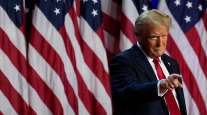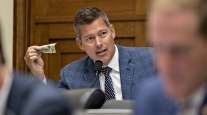Global Finance Chiefs Told Trade Tensions Are Hitting Confidence

Trade tensions between the United States and China risk eroding business and investor confidence, even as global growth enjoys its best upswing in years.
That’s the message being conveyed to finance ministers and central bankers from around the world gathered in Washington for spring meetings of the International Monetary Fund. Trade is expected to dominate discussions as the world’s two biggest economies exchange threats of tariffs and other protectionist measures.
“What is extraordinarily meaningful is the questioning of the overall system under which operators have been operating in for decades,” IMF Managing Director Christine Lagarde said April 19 at a press conference. “It’s the confidence that risks being eroded.”
The fund on April 17 left its forecasts for global growth this year and next at the 3.9% it estimated in January — the world economy’s deepest and broadest upswing since 2011. The United States argues China needs to lower its barriers to imports and foreign investments, while Beijing is criticizing President Donald Trump’s threats to levy tariffs on Chinese goods.
U.S. Pressure
In a sign that the tensions won’t be easing anytime soon, White House Council of Economic Advisers Chairman Kevin Hassett said the world should put pressure on Beijing and called on other countries to hold the Asian nation to task on trade.
“The entire world community needs to urge them to change” their behavior, he said at an event hosted by the Institute of International Finance.
The hawkish stance was backed up by Vice President Mike Pence’s chief economist, Mark Calabria, who urged China to move toward a market-based economy that plays by international rules.
“We certainly want to avoid a trade war, but you have to credibly signal that you are going to be willing to put some pain both on the other side as well as yourself,” Calabria said.
Beijing Braced
Chinese officials, including People’s Bank of China Governor Yi Gang, have so far kept a low profile during the meetings, though the government in Beijing already has made clear it will retaliate to any U.S. protectionism. Commerce Ministry spokesman Gao Feng said April 19 at a briefing in Beijing that the government is “ready to take necessary steps” to protect domestic companies.
Ilan Goldfajn, Brazil’s central bank chief, said he’s worried that trade disputes could upset financial markets and derail the steady global expansion.
“I’m concerned these types of conflicts will lead to risk-off in markets, high premiums, less capital flows and at the end of the day the benign environment that we’ve been enjoying for the last few years will not continue,” Goldfajn said in an interview.
While such a backdrop poses headwinds for confidence, there remains optimism among some officials that a deal will be reached to avoid tensions snowballing into a full-blown trade war.
Australian Finance Minister Mathias Cormann said in an interview that he expects an agreement to be reached. Sri Lanka’s junior finance minister, Eran Wickramaratne, described the dispute as a “glitch” that will pass.
Chilean Economy Minister Jose Ramon Valente was among those to play down concerns.
“There is a trend toward free trade, opening and integration of countries, and these are potholes we find along the way,” Valente said in an interview.
With assistance by Xiaoqing Pi, Jeanna Smialek, Saleha Mohsin, and David Biller




